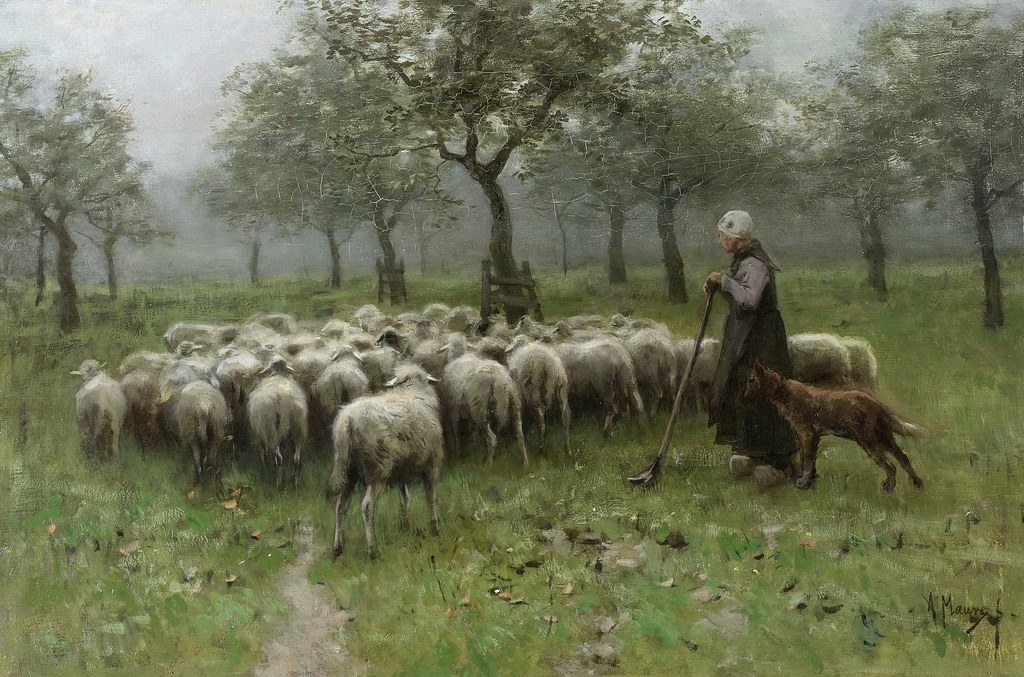It was a glorious July day in the Maine countryside a few years ago, and we were enjoying the first evening of a family reunion. My husband’s aunt looked thoughtfully at a meadow teeming with exceedingly rowdy screaming children, mine among them, numbering somewhere in the vicinity of twenty, although the noise level made it seem closer to a solid hundred. Laconically she remarked before disappearing back into the kitchen: “too many chiefs and not enough Indians.”
She was right, of course. But her comment, applicable as it was to a band of (mostly) boy cousins with too many opinions about their unfolding game, is no less significant for our society at large. We live in a world that encourages too many unqualified chiefs or shepherds to pursue positions of power and stay in them no matter what. Disgraced shepherds merely get moved around to new pastures. At the same time, our culture denigrates as sheep not just those who might follow these unqualified leaders, but also those who wish to live their lives faithfully and quietly without authority or its trappings. Our view of both sheep and shepherds is utterly warped, and the fallout shows in every sphere—in churches, in the workplace, in politics.
That we are not an agrarian society is reflected in how we speak of sheep, that quintessential antithesis of leaders. Sheep are not interested in leading but are dreaming of a quiet rooted life. When used to describe Jesus’ followers in the New Testament and in the early church, the term “sheep” was originally one of endearment and beautiful tenderness in an otherwise brutal world. It readily brings to mind the image of the Good Shepherd in early Christian art—Jesus carrying a lamb upon His shoulders. It is a picture of unconditional love—of a shepherd willing to search for his lost sheep high and low in the night, willing to carry a hurt sheep even while bent down from the weight and exhaustion, willing, ultimately, to die for the sheep. This image also reveals the worth of sheep: they are, to their shepherd, a priceless treasure. Not one shall be lost.
We have come a long way since. Today, to call someone a sheep is more often than not used as an insult. To be a sheep is to be an intellectual lightweight, unwilling to think for oneself, likely to follow blindly to one’s doom. In Nancy Shaw’s bestselling children’s book series, sheep drive a jeep, sail a ship, go out to lunch, or take a hike—all with hilariously disastrous results that exemplify the worst of what we think already about the intelligence level of sheep. “Uh oh, the jeep won’t go.” Indeed.
Yet let us consider a simple mathematical truth that applies to every organization: the sheep must outnumber the shepherds. Followers must be many, whereas leaders are generally quite few. At any given moment, there is only one president of a country or corporation or university, just one mayor of a town, just one lead pastor of a church. And so, we face a mathematical conundrum. There are too many who wish to be shepherds instead of sheep.
The over-bloated Republican presidential primary this past fall offered a prominent example of my relative’s adage that we live in a society with too many aspiring chiefs who are not content to remain sheep. Unwilling sheep make the worst kind of sheep, by the way. At the same time, unwilling sheep who have turned the post of shepherd—whether it be in politics or in a religious organization or on a university campus or in a corporation—into a personal idol, also make the worst shepherds. These are the shepherds who just might eat their own sheep, if times get difficult, instead of keeping their charges safe from prowling wolves.
But enough about bad shepherds. Let us come back to the virtues of good sheep. There is an important truth that emerges even in the common caricatures about them, these mocking tales about sheep who are indeed out to lunch in more ways than one. They are, except when terrified and in truly hairy situations, deeply happy creatures. They are content to enjoy the simple pleasures in life and do not aspire to a station far above one for which they are qualified—for which they were created. The same cannot be said about failed shepherds who spend their lives in machinations over the gaining of power, gaining yet more power, keeping power at all costs, and viciously struggling to regain it, if it is ever lost to them.
A chief virtue of sheep is, indeed, that they are content with remarkably little, and—this is key—they are rooted and aware citizens of their locale. Not dreaming to kick their native land, they are happy not just with what they have, but with where they are, who they are, whose they are. They do not struggle with existential crises of living in the modern world, for sometimes the simplest answer is the correct one. They are who they were made to be. And so, they live out that calling, directly connected to the land from which they live, on which they dwell, and in which they follow their good shepherd, the one whose voice they know, in whose comfort and care they instinctively trust. The ideal shepherd too, after all, is local. He is not a sensational leader, one flaunting leadership skills for the watching eyes of other flocks rather than tending the health of his own sheep. Such performative shepherds never wanted to be just a sheep but aspire always to accrue more sheep—preferably better sheep than the ones found right back home, by the way.
I am deliberately avoiding including any names here—for that is not the point. Of course, readers are welcome to fill in the blanks for themselves: what sheep or shepherds come to mind in national or international politics or in your workplace or church or local community? Are you a sheep or a shepherd? Are you a content sheep, gently encouraging other sheep around while treasuring the community in which you dwell—that common pasture that sustains you all? Or are you an angry sheep, eager to become a shepherd, pushing others out of the way in the process? How easy it is to rage against injustice and promise to fix it all—if only you could be the one in charge.
But even those who are content with being good and faithful sheep might sometimes find themselves following the example of the gentle shepherd, carrying that tired child home in your arms when she cannot walk another step on a family hike.
Image Credit: Anton Mauve “Shepherdess with Flock of Sheep” (1870-188) via Flickr







4 comments
Julie
I live in the UK… I am also an artist who paints sheep. The Lord put it on my heart many years ago to do this because of the spiritual side of being that sheep who hears the Masters voice. Very interesting reading, as sadly I have been around many sheep who think they know how to lead when they are just barely lambs. So we continue on, feeding the lambs who want to be nourished and allowing ourselves to be led by our one and true Master. Blessings to you .
Alex Purnomo
Spot on! Well written. So helpful. Thank you, from a pastor of a little multiethnic church in Sydney, Australia
Brian D Miller
Umm, I don’t know, Nadya. I get the gist of your essay. And you get no argument from me that a society that rubs shoulders instead of throwing elbows is preferable, that being rooted builds community, and that a leader/shepherd should serve the interests of the flock or farm. But in my modest experience the hens in my flock of chickens have more intelligence than the average sheep. And that sadly is really saying something. So I am not sure what type of societal model we are aiming for today if the key component is just bone-headed ignorance? But the descriptions of acting as sheep in popular literature always strike me as pretty apt. As is common to say among shepherds, sheep are born looking for a way to die. And while they are a flock animal there is also little selflessness on exhibit when faced with a danger. As the old joke goes, you don’t have to be the fastest one running from an angry bear, just the second slowest. That pretty much sums up the mentality of sheep, with their “after me, please” approach. And don’t even get me started on rams (only two things on their mind, mounting any movable target and running full speed at any too slow to move target). But if you really want to watch a communal structure breakdown in just mere moments, join me at feeding time for the ewes.
However, where your analogy might have strength is glimpsed during the lambing process and when observing the profound maternal instincts of ewes in nurturing their young over the following weeks. I have to admit, that is a pretty special time.
MEC
Wow Brian…..you really missed it!!
🙏🏻
Comments are closed.